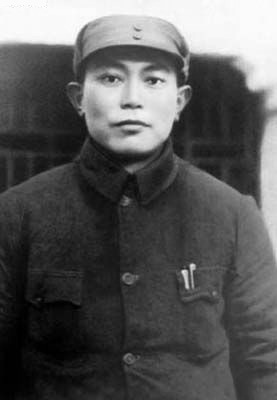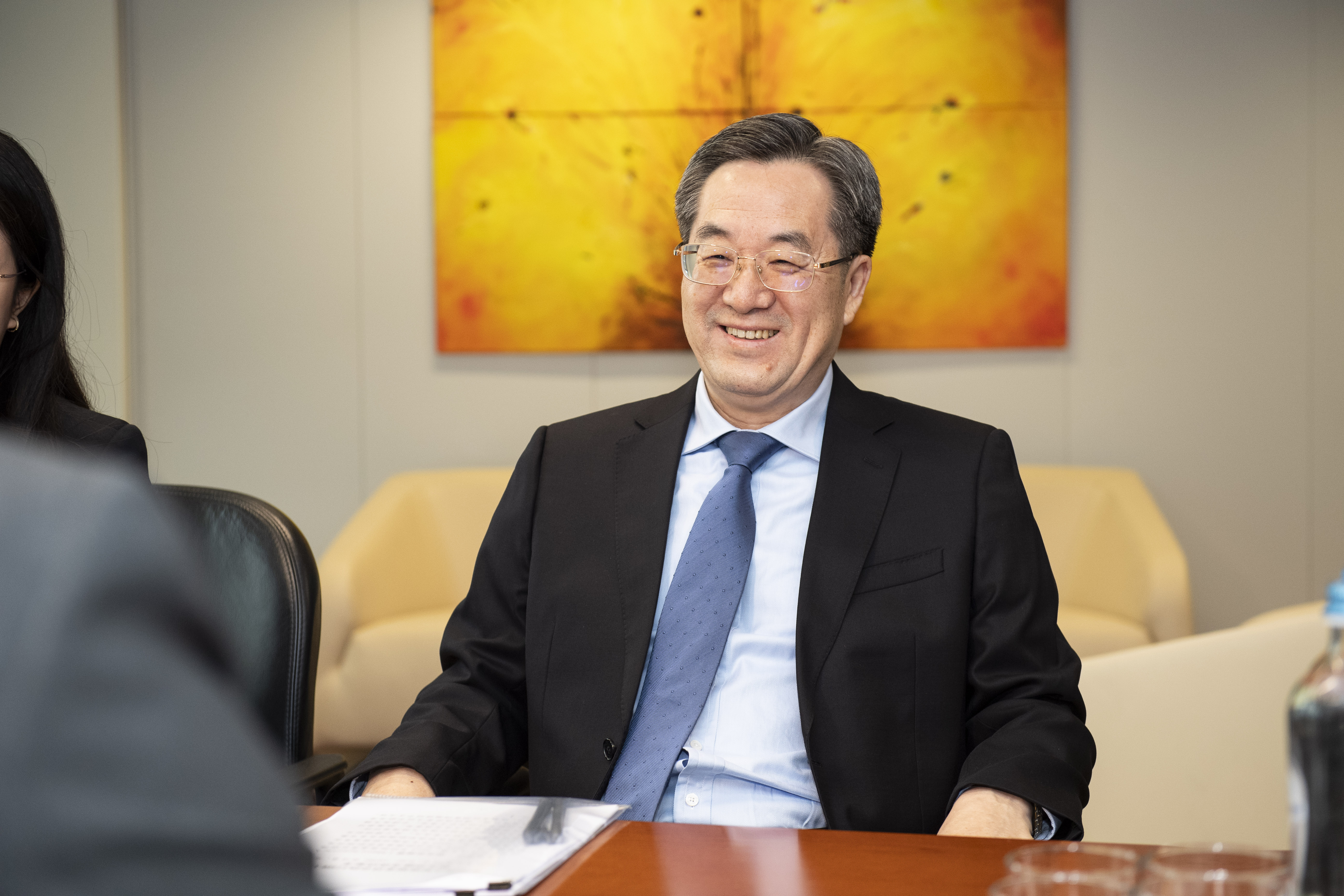|
Office Of The President Of The People's Republic Of China
The Office of the President of the People's Republic of China is a bureau whose staff is assigned to work directly under, and closely with the president of China. History In 1954, the Chairman of the People's Republic of China established a daily office - the General Office of the Chairman of the People's Republic of China. On July 30, 1955, Chairman Mao Zedong appointed Zhang Jingwu as Director of the General Office. Zhang became the only Director of the General Office of the chairman in history. He also served as the Representative of the Central People's Government in Tibet and the First Secretary of the Chinese Communist Party's Tibet Working Committee. In 1959, after Liu Shaoqi succeeded Mao Zedong as the Chairman of the PRC, Zhang continued to serve as the Director of the General Office. After the outbreak of the Cultural Revolution, Chairman Liu quickly lost power, and the General Office of the chairman ceased to operate. Zhang Jingwu was subsequently imprisoned in Qinchen ... [...More Info...] [...Related Items...] OR: [Wikipedia] [Google] [Baidu] |
Li Xiannian
Li Xiannian (; 23 June 1909 – 21 June 1992) was a Chinese Chinese Communist Party, Communist military and political leader, president of China from 1983 to 1988 under paramount leader Deng Xiaoping and then chairman of the Chinese People's Political Consultative Conference from 1988 until his death. He was a full member of the Politburo of the Chinese Communist Party, Politburo from 1956 to 1987, and of its Politburo Standing Committee of the Chinese Communist Party, Standing Committee from 1977 to 1987.''Li Xiannian (1909–1992)'', in Christopher R. Lew, Edwin Pak-wah Leung: ''Historical Dictionary of the Chinese Civil War'', p.p. 120-121, Scarecrow Press, 2013Holley, David"Li Xiannian, Ex-President of China, Dies at 83: Old Guard: He was one of a ruling clique of ‘8 elders’ who ordered the army to repress the pro-democracy movement in 1989".''Los Angeles Times'', 23 June 1992. Li worked as an apprentice carpenter in his teenage years to support his family. He joined the Com ... [...More Info...] [...Related Items...] OR: [Wikipedia] [Google] [Baidu] |
Office Of The Premier Of China
The Office of the Premier of the State Council of the People's Republic of China is a bureau whose staff is assigned to work directly under, and closely with the premier of the State Council. History In the early 1950s, the Government Affairs Commission of the Central People's Government (renamed the State Council of China in 1954) had a Premier's Office, which had a maximum of 17 secretaries. At the end of 1957, the first major streamlining was carried out, leaving only 9 secretaries, including the director and deputy director, who took office in April 1958. After streamlining, only six or seven people were left by 1957 and 1958. Secretaries were generally divided into foreign affairs, culture and education, politics and law, economy, and military affairs. In 1965, in order to carry out the "institutional revolution", the Premier's Office was removed from the State Council (the third session of the 1st National People's Congress, which closed on January 4, 1965, passed a releva ... [...More Info...] [...Related Items...] OR: [Wikipedia] [Google] [Baidu] |
Ding Xuexiang
Ding Xuexiang (born 13 September 1962) is a Chinese politician who is currently the first-ranked vice premier of China and the sixth-ranked member of the Politburo Standing Committee of the Chinese Communist Party. Considered a close confidant of CCP general secretary Xi Jinping, Ding served as Xi's staff during his tenure in Shanghai, then followed him to Beijing. He served as the director of the CCP General Secretary's Office between 2013 and 2023 and the director of the CCP General Office between 2017 and 2023. He was also a member of the 19th Party Politburo, and a Secretary of the Party Secretariat between 2017 and 2022. Early life and education Ding Xuexiang was born in Nantong, Jiangsu province, on 13 September 1962. He enrolled in college in 1978 at the age of 16, graduating from the Northeast Heavy Machinery Institute in Qinghuangdao, later renamed Yanshan University, in 1982 with a degree in engineering. Ding got his first job at the Shanghai Research Inst ... [...More Info...] [...Related Items...] OR: [Wikipedia] [Google] [Baidu] |
Chen Shiju
Chen Shiju () was an important political aide for China's former leader Hu Jintao. Chen served as Hu's secretary beginning in Guizhou 1986. Chen was the director of the Office of the General Secretary of the Chinese Communist Party under Hu Jintao from 2002 to 2012. Chen concurrently served as deputy director of the General Office of the Chinese Communist Party The General Office of the Central Committee of the Chinese Communist Party, often referred to as the Central Office (), is an office directly under the Central Committee of the Chinese Communist Party in charge of providing support for the Cent .... In 2015, he held a concurrent post on deputy director of the Central Guidance Commission on Building Spiritual Civilization. References Hu Jintao Year of birth missing (living people) Living people Chinese government officials {{China-politician-stub ... [...More Info...] [...Related Items...] OR: [Wikipedia] [Google] [Baidu] |
Office Of The General Secretary Of The Chinese Communist Party
The Office of the General Secretary of the Central Committee of the Chinese Communist Party often referred to as the General Secretary's Office (总书记办公室) is a bureau whose staff is assigned to work directly under, and closely with the Chinese Communist Party (CCP)'s General Secretary. The Office manages personal affairs of the General Secretary and is a part of the Central Committee, but reports directly to the General Secretary. The director of the Office of the General Secretary and the staff under him are considered to be Mishus, or trusted confidants responsible for maintaining the private information and correspondence of the party's leader. The office is distinct from, and administratively subordinate to, the CCP General Office, whose staff support the many party departments under the CCP Central Committee, the CCP Secretariat and the CCP Politburo. In spite of this distinction, Cai Qi, the incumbent head of the Office of the General Secretary, is concurren ... [...More Info...] [...Related Items...] OR: [Wikipedia] [Google] [Baidu] |
Jia Ting'an
Jia Ting'an (; born September 3, 1952) is a retired general in the Chinese People's Liberation Army. He served as the deputy director of the Political Work Department. He was a principal aide to Jiang Zemin, former General Secretary of the Chinese Communist Party (paramount leader). Career Jia was born in Ye County, Henan province. He graduated in 1973 from the Chengdu Telecommunications Engineering College (), where he studied microwaves. In 1982 he joined the staff of Jiang Zemin, who was serving as Minister of Electrical Industry at the time. Later Jiang became Mayor of Shanghai, then Party Secretary. In 1989 after the Tiananmen Square protests, Jiang was promoted to General Secretary of the Chinese Communist Party and Jia joined him on his staff, serving in the Office of the General Secretary and Office of the Central Military Commission Chairman. In 1994 he became deputy head of the General Office serving the Central Military Commission (CMC). He was promoted to major genera ... [...More Info...] [...Related Items...] OR: [Wikipedia] [Google] [Baidu] |
Jiang Zemin
Jiang Zemin (17 August 1926 – 30 November 2022) was a Chinese politician who served as General Secretary of the Chinese Communist Party, general secretary of the Chinese Communist Party (CCP) from 1989 to 2002, as Chairman of the Central Military Commission (China), chairman of the Central Military Commission (China), Central Military Commission from 1989 to 2004, and as president of China from 1993 to 2003. Jiang was the fourth paramount leader of History of the People's Republic of China (1989–2002), China from 1989 to 2002. He was the Leadership core, core leader of the Generations of Chinese leadership, third generation of Chinese leadership, one of four core leaders alongside Mao Zedong, Deng Xiaoping, and Xi Jinping. Born in Yangzhou, Jiangsu, Jiang joined the CCP while he was in college. After the establishment of the People's Republic of China in 1949, he received training at the ZiL, Stalin Automobile Works in Moscow in the 1950s, later returning to Shanghai in 196 ... [...More Info...] [...Related Items...] OR: [Wikipedia] [Google] [Baidu] |
Yang Shangkun
Yang Shangkun (3 August 1907 – 14 September 1998) was a Chinese Chinese Communist Party, Communist military and political leader, president of the People's Republic of China from 1988 to 1993, and one of the Eight Elders that dominated the party after the death of Mao Zedong.Yang Shangkun (Yang Shang-kun) (1907-1998) in ''China at war: an Encyclopedia'', edited by Xiaobing Li, pp. 512–514, ABC-CLIO, 2012. Born to a prosperous land-owning family, Yang studied politics at Shanghai University and Marxism, Marxist philosophy and revolutionary tactics at Moscow Sun Yat-sen University. He went on to hold high office under both Mao Zedong and later Deng Xiaoping; from 1945 to 1965 he was Director of the General Office of the Chinese Communist Party, General Office and from 1945 to 1956 Secretary–General of the Central Military Commission (China), Central Military Commission (CMC). In these positions, Yang oversaw much of the day-to-day running of government and Party affairs, both ... [...More Info...] [...Related Items...] OR: [Wikipedia] [Google] [Baidu] |
Constitution Of China
The Constitution of the People's Republic of China is the supreme law of the People's Republic of China (PRC). In September 1949, the first plenary session of the Chinese People's Political Consultative Conference adopted the Common Program, which acted as the temporary constitution after the PRC's foundation. On September 20, 1954, the first constitution was adopted by the first session of the 1st National People's Congress. The constitution went through two major revisions in 1975 and 1978. The current constitution was adopted by the 5th National People's Congress on December 4, 1982, with five subsequent revisions. The current constitution consists of 4 chapters and 143 articles. It explains the nature of the People's Republic of China, highlights the concept of democratic centralism, and states that the People's Republic of China is a "socialist state governed by a people's democratic dictatorship that is led by the working class and based on an alliance of worker ... [...More Info...] [...Related Items...] OR: [Wikipedia] [Google] [Baidu] |




